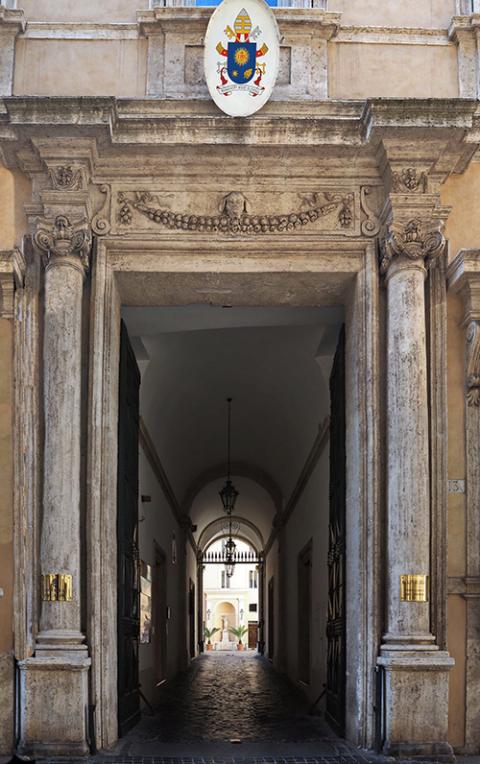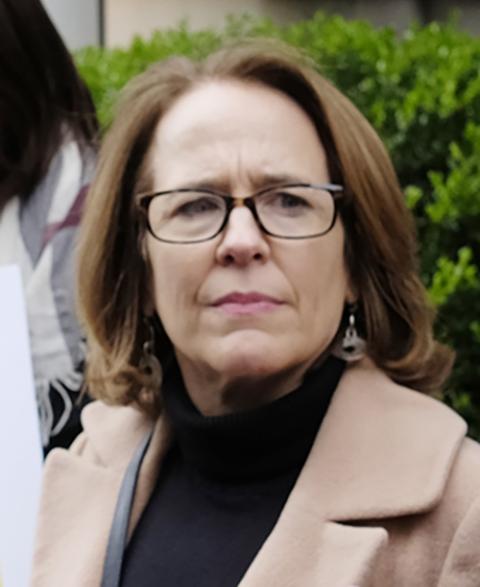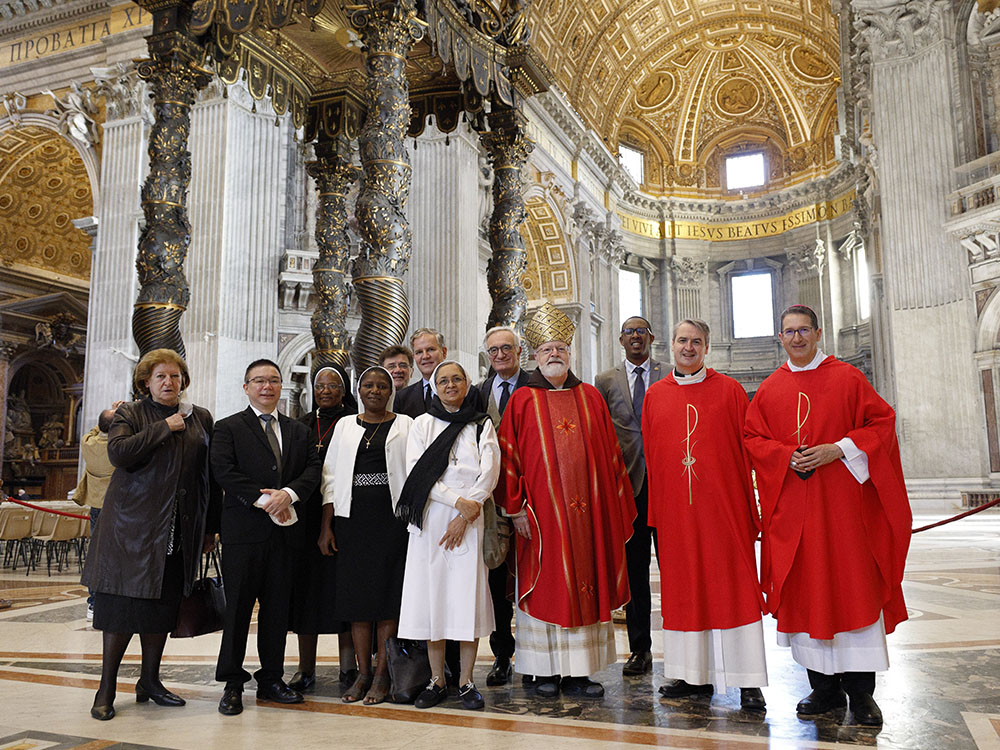
Boston Cardinal Sean O'Malley, president of the Pontifical Commission for the Protection of Minors, and other members of the commission are pictured before attending Mass in St. Peter's Basilica at the Vatican April 29, 2022. (CNS/Paul Haring)
When German Jesuit Fr. Hans Zollner resigned from Pope Francis' abuse commission March 29, mounting a searing criticism of the organization's leadership and its alleged lack of transparency, it plunged an already beleaguered body into crisis.
As the commission meets in Rome this week for a previously scheduled May 3-6 summit, its president, Boston's Cardinal Sean O'Malley, said the body would address the concerns raised by Zollner, while also noting that he strongly disagreed with the Jesuit's assessment of the commission's effectiveness.
The organization, founded in 2014 as the Pontifical Commission for the Protection of Minors and with a mandate to advise the pope on child abuse prevention and accountability measures, has already suffered a number of setbacks, including the previous resignation of several other high-profile members who have questioned its ability to cut through the Vatican's red tape and challenge its culture of secrecy.
But the departure of Zollner — combined with a recent reorganization of the commission's personnel — has raised questions about the commission itself and heightened the stakes for its plenary assembly, with observers and abuse survivors alike saying the pope's credibility when it comes to fighting abuse is on the line.
High-profile departures
When the commission was first established, it was heralded as a new day in the church's efforts to combat clergy sex abuse.
The appointment of O'Malley, widely considered a leading figure in abuse prevention efforts, as the organization's head signaled that the body would be a serious entity. The selection of outside members who were leading figures in their own respective fields of law enforcement, psychology and psychiatry provided the commission with both independence and expertise.
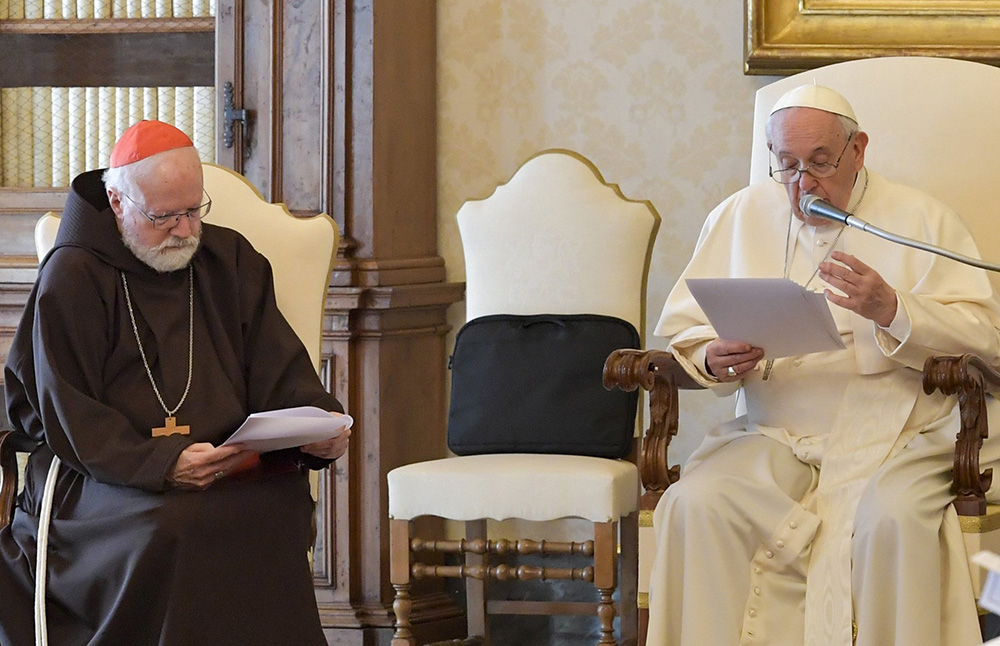
Boston Cardinal Sean O'Malley listens as Pope Francis speaks during a meeting with members of the Pontifical Commission for the Protection of Minors at the Vatican April 29, 2022. (CNS/Vatican Media)
According to former commission member Gabriel Dy-Liacco, a psychotherapist and pastoral counselor based in the Philippines, two initial goals were to provide advice to Francis on how to best reform the church's structures to improve its safeguarding efforts and to offer proposals for policy and initiatives for local churches.
Dy-Liacco, who served two terms from 2014 to 2022, estimated that since its founding, commission members have led more than 1,000 safeguarding workshops or seminars around the world, especially in developing nations.
Soon after the group's founding, however, tensions surfaced.
British abuse survivor Peter Saunders and Irish survivor Marie Collins both resigned from the body in 2017. In an exclusive essay for NCR, Collins wrote at the time: "The most significant problem has been reluctance of some members of the Vatican Curia to implement the recommendations of the Commission despite their approval by the pope."
But when Zollner — a psychologist and psychotherapist who leads a prominent safeguarding institute in Rome and who was tapped by the pope to help organize the Vatican's unprecedented 2019 abuse summit — announced his resignation, his reason was not the Roman Curia, but the commission itself.
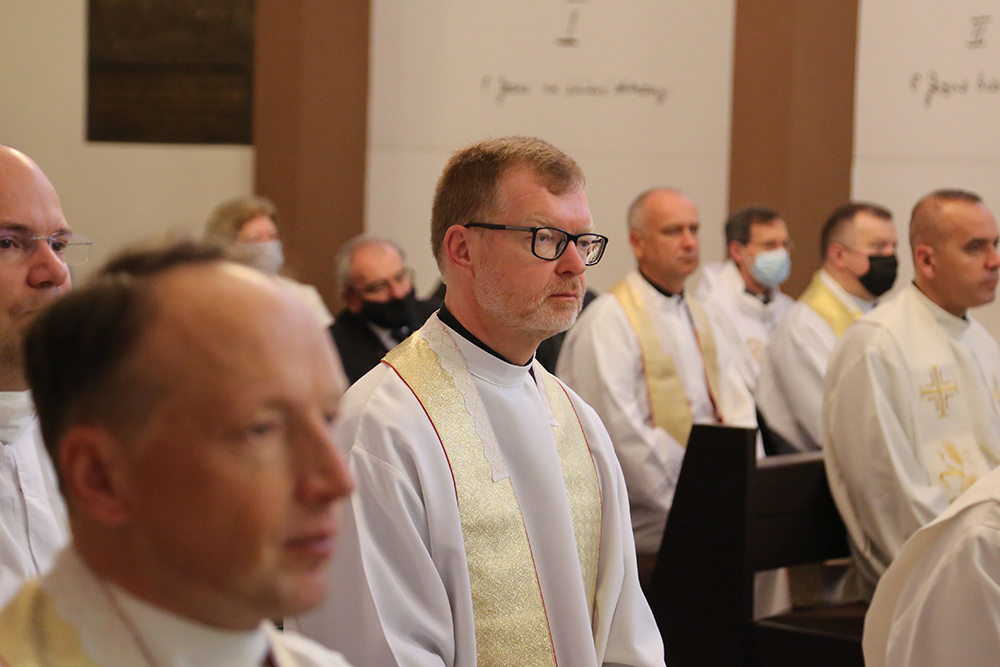
Jesuit Fr. Hans Zollner, center, then a member of the Pontifical Commission for the Protection of Minors, is seen at a conference of church representatives and child protection experts in Warsaw, Poland, Sept. 20, 2021. (CNS/Courtesy of EpiskopatNews)
In a sharply worded statement, he said it was "impossible" to continue given mounting concerns "in the areas of responsibility, compliance, accountability and transparency." He further noted that there had been a lack of clarity regarding "the selection process of members and staff and their respective roles and responsibilities."
Anne Barrett Doyle, co-director of the abuse tracking website BishopAccountability.org, said she was "stunned" by Zollner's resignation, telling NCR that it is a "resounding validation" of the departures of other commission members, such as Collins and Saunders.
These individuals, she noted, hold "impressive credentials" and their willingness to serve on the commission meant that they were willing to put their professional reputations on the line to work with the Vatican in hopes to better the church's response to the abuse crisis.
"These are all reasonable people who earnestly tried to work within the system," said Barrett Doyle. "Their departures signal that the commission is as toothless and ineffective as we feared it would be. The situation sounds dismal," she added.
Zollner's public exit also sent shockwaves through former commission members, as well.
Advertisement
In an interview with the BBC, former commission member Baroness Sheila Hollins described Zollner's departure as a "huge loss," noting that she holds the Jesuit "in the highest regard."
"He's a man of integrity," said Hollins, who is the former president of the Royal College of Psychiatrists in the United Kingdom. "He communicates especially well with priests, religious and bishops."
Dy-Liacco, however, offered a more optimistic take, saying that while Zollner's "reasons are valid," he sees the concerns raised as "growing pains with any new thing."
He also noted that the fact that Zollner and O'Malley have expressed their disagreements in a public setting is a sign of hope for an institution that often likes to sweep conflict under the rug.
"It's good that it's all very transparent," he told NCR. "No one is getting punished for it. I think that's really good and very healthy. I don't know that things happen that way often in the church."
Leadership under scrutiny
Two weeks after Zollner's departure, on April 13, The New York Times was given an exclusive by the commission to announce that it was getting a new home — moving from its tiny offices inside the Vatican to a 16th-century palazzo in the center of Rome.
According to the article, the commission's secretary, Oblate Fr. Andrew Small, bypassed other Vatican officials to help secure the space. The ornate new offices, he said, would become the "palace of the survivors."
Barrett Doyle of BishopAccountability.org, however, called the splashy article a "distraction" from the issues the commission is responsible for overseeing. "Since when does relocating one's office merit a full photo spread in The New York Times?" she asked.
She was not alone in expressing concern.
An editorial in Il Sismografo, an influential church news website followed closely by Vatican officials, said the article "tells an incredible and painful story as members of this delicate commission use the terrible story of clerical and victim pedophilia to promote themselves with statements that are, among other things, senseless and in very bad taste."
Small, a British-born lawyer who served as former foreign policy adviser for the U.S. bishops' conference, was appointed by Francis to his post pro tempore ("for the time being") in June 2021.
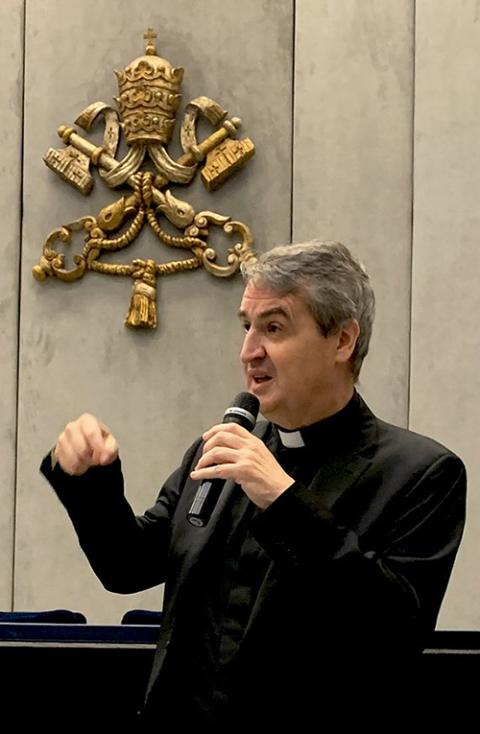
Oblate Fr. Andrew Small speaks to reporters in the Vatican press office Oct. 28, 2022, about the fall meeting of the Pontifical Commission for the Protection of Minors. (CNS/Cindy Wooden)
As acting secretary, he oversaw a reshuffling of the commission's membership last September by naming 10 new members and reappointing 10 returning members, as well as the addition of a number of new staff members and new safeguarding agreements, including with the Italian bishops' conference.
But Small, who is the former head of the Pontifical Mission Societies in the United States, does not have background in abuse prevention, leading some former commission members to question why he was selected for the role.
Earlier this month, Hollins told the BBC that she had met with Small in November.
"I have to say I was not impressed," she admitted.
"You need to have people in leadership in this who actually have not just the authority to do it, but have got the professional competences," Hollins continued. "And I think at the moment, that I am unconvinced that the right competencies are in place."
Is the commission still independent?
Ahead of the May 3-6 plenary, a communiqué outlining the commission's plenary agenda said there would be a review on the commission's task of providing annual audits of safeguarding reports by bishops' conferences, a review of its five-year strategic plan, and an "open discussion on how to better define working methods, roles and responsibilities" of the body, among other agenda items.
Collins believes an essential question is one also expressed by Zollner in his resignation: "Who is the commission?"
In recent months, the commission's staff has dramatically increased, with its current organizational chart listing 16 personnel under O'Malley and Small's leadership. When the commission first began, its role — as independent and outside experts — was to propose projects, policies and initiatives.
Now, said Collins, "commission members no longer propose projects but are given tasks."
"That really worries me," she added, expressing frustration that in a recent interview, O'Malley referred to commission members as "volunteers."
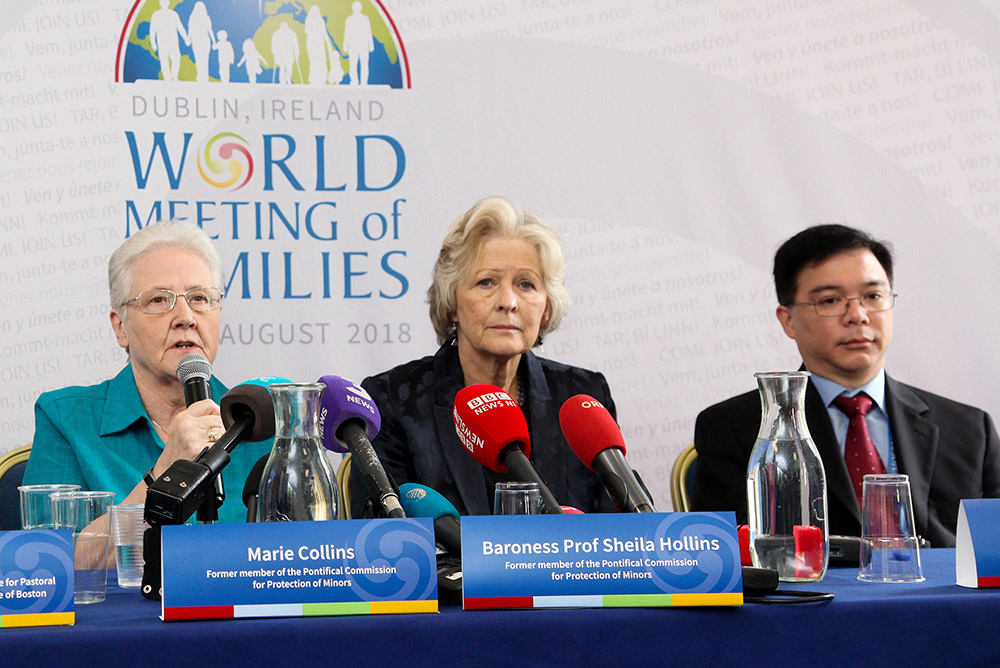
Marie Collins, Baroness Sheila Hollins and Gabriel Dy-Liacco are seen at a news conference at the World Meeting of Families Aug. 24, 2018. (CNS/Courtesy World Meeting of Families/John McElroy)
"We've never been called a group of volunteers before," she told NCR. "We were always called a group of experts." She said the downgrading of their contribution was "disparaging."
"It's not clear who are the commission," she continued. "Is it the experts who are appointed or is it now the staff members who are deciding what work is done and putting things to the commission to rubber stamp?"
This new reconfiguration, she feared, also jeopardizes the independence of the commission.
"Staff members are going to be employed by the Vatican," said Collins. "They're answerable to their employers, whereas the experts are independent."
"The power has been moved to the hands of employed staff, and I think that shift is wrong," she said.
Last June, the Vatican's new apostolic constitution took effect, which reorganized the church's central bureaucracy, including locating the abuse commission within the Vatican's doctrinal office, which is responsible for investigating and prosecuting abuse cases.
While O'Malley praised the move at the time as making the commission a "fundamental part of the structure of the Church's central government," Collins continues to express concerns about how this move will affect the body's independence.
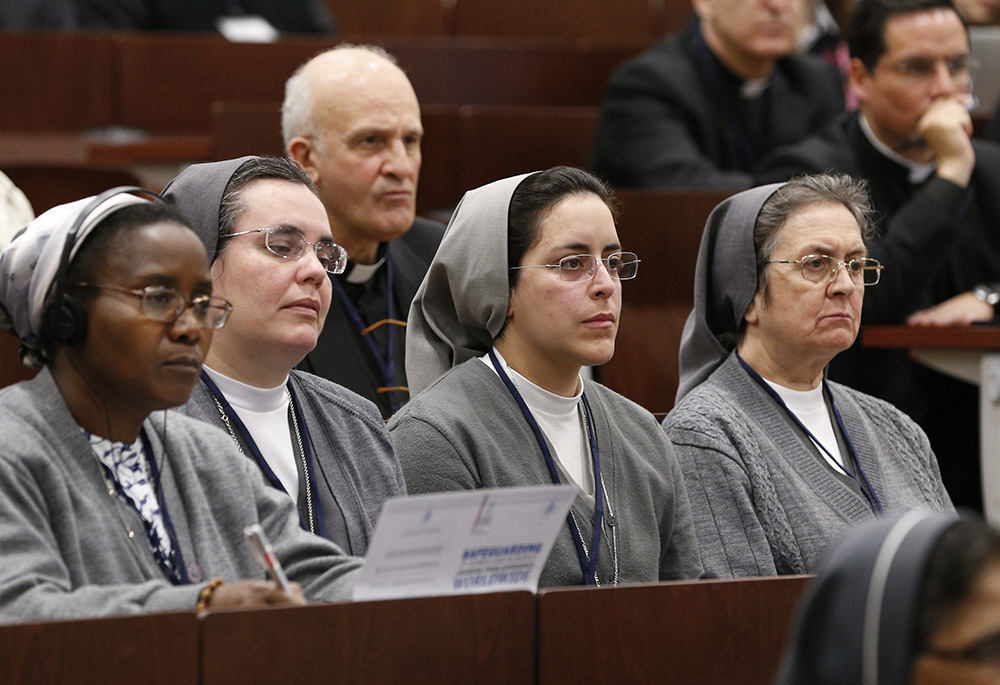
Nuns attend a seminar on safeguarding children at the Pontifical Gregorian University in Rome March 23, 2017. The seminar was organized by the Pontifical Commission for the Protection of Minors. (CNS/Paul Haring)
For survivors of abuse, she said, the commission cannot risk being seen as subservient to the doctrinal department.
Earlier this year, the pope made permanent his signature clergy sex abuse law, Vos Estis, which was established to hold bishops and religious superiors accountable for abuse that they commit or cover up, and tasked the commission with its implementation.
But for Barrett Doyle, there is a contradiction in placing the commission inside the doctrinal office, if the commission is to have any success in holding priests and bishops responsible.
"It strips the commission from having any enforcement of the pope's major accountability law if they are to be subordinate to one of the departments it should be holding accountable," she said.
An appeal to Francis
Despite the turmoil of the last month, on April 21, the Vatican announced a new partnership between the commission and the Dicastery for Evangelization, which is responsible for mission churches, including many countries and churches that lack proper guidelines for abuse.
Collins, however, says the commission is effectively rebranding the work that commission members began doing in 2016 by providing training to new bishops when they come to Rome for what's known as "baby bishops' school" and leading sessions for other Vatican departments.
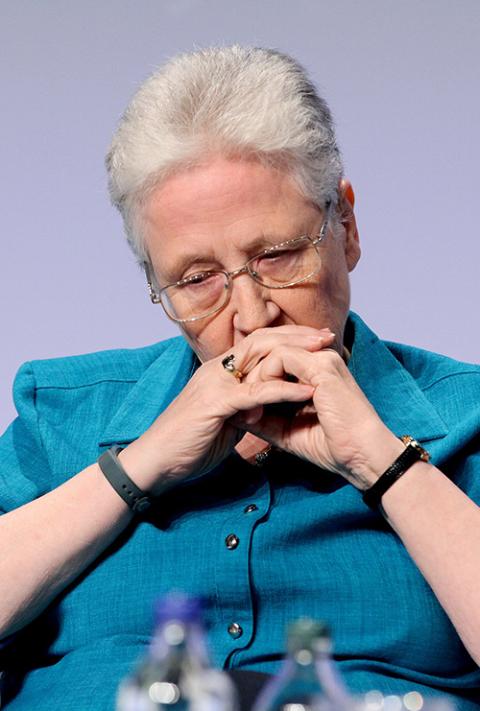
Marie Collins at the World Meeting of Families in Dublin Aug. 24, 2018 (CNS/Courtesy World Meeting of Families/John McElroy)
"I'm shocked that he's announcing these things as new," she said, noting that she had taken part in the training of new bishops between the years of 2016-18 and had previously led a session for the Vatican's evangelization department.
"He [O'Malley] knows very well they've been in place for years," said Collins. "It bothers me as I know people who worked very hard for a number of years."
As the newly formed commission gathers in Rome this week, she says she is pleased the commission is making a new start and with new personnel — but that if it wants to move forward with credibility, it must address what she describes as deeply serious concerns about its independence and transparency.
A May 3 report in The Irish Times revealed that Collins, along with former President of Ireland Mary McAleese, have co-authored a letter to Francis saying the commission has suffered "existential damage" following Zollner's departure.
The two women plead for the pope to directly intervene to save the commission and establish an independent, external review of the commission's operations.
"With all due respect, no internal debate is likely to be adequate to the task of safeguarding the future of the church's key safeguarding commission," they write.
Ahead of the commission's gathering, Dy-Liacco urged patience, saying he believed the pope's new constitution should allow the body to begin to reconstitute its work as he hopes the culture within the Vatican will continue to change.
Barrett Doyle is less optimistic, saying that "the bigger picture here is that the pope's anti-abuse platform is collapsing like a house of cards, and that is heartbreaking."
And for Collins, she said she isn't giving up yet — but time is of the essence.
"Pope Francis has tried hard," she said. "He has definitely moved forward with giving the commission the mandate. I don't think he's ignored the problem [of abuse]."
But she added: "He needs someone to come along now and be more forceful to put into place the practical changes, backing an independent commission to make the changes that are necessary."

